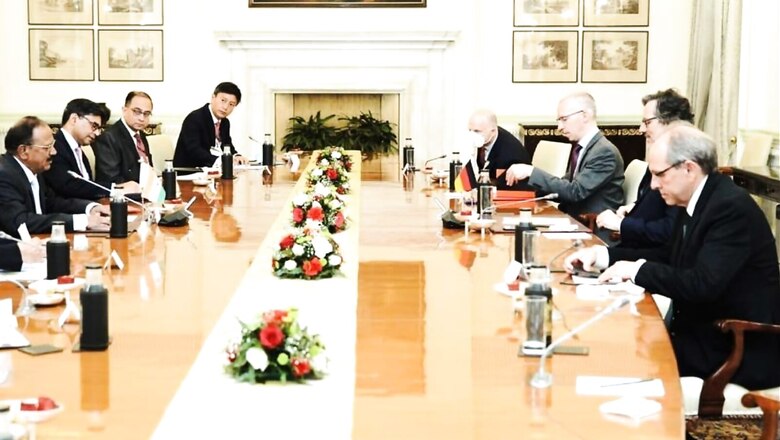
views
There is a sudden gush of visits by Western leaders and diplomats to India over the Ukraine crisis. The influx comes even as India continues to maintain its position on Russia vis-à-vis Ukraine, both in the United Nations and otherwise too, as it expressed its intention of buying discounted oil from Russia.
UK foreign secretary Elizabeth Truss is the latest to land in New Delhi to hold talks with her counterpart S Jaishankar on Thursday. She comes with a clear message from Europe — all countries must “reduce strategic dependency on Russia at this time of heightened global insecurity”, said a press release from the British High Commission in New Delhi. In a statement, Liz Truss said: “This matters even more in the context of Russia’s unprovoked invasion of Ukraine and underlines the need for free democracies to work closer together in areas like defence, trade and cyber security.”
However, India’s stand on defence ties with Russia has been made clear since 2019 when, despite the threat of America’s CATSAA sanctions, India said it will go ahead with the S-400 deal with Russia. In a joint press conference with the then US Secretary of State Mike Pompeo in June 2019, External Affairs Minister S Jaishankar said, “We have many relationships with many countries. Many of them are of some standing, they have a history. So I think we will do what is in our national interest, and again, part of that strategic partnership is the ability of each country to comprehend and appreciate the national interest of the other.”
It was ahead of this visit in 2019 that India had also brought down to zero its purchase of oil from Iran due to US sanctions. Sources have told CNN-News18 that since discontinuing imports from Iran and Venezuela, alternatives have come at a cost for India. Hence, India’s decision to buy discounted oil offered by Russia to mitigate any domestic crisis is justified, especially when 75% of Russia’s natural gas export is to OECD Europe like Germany, Italy and France.
Meanwhile, just a day ahead of Liz Truss landing in India, Jens Plotner — Security and Foreign Policy Adviser to the German Chancellor — was also in New Delhi. He met National Security Advisor Ajit Doval. Government sources told News18.com that the NSA emphasised India’s consistent approach for the peaceful settlement of disputes in accordance with international law and India’s commitment to the UN charter and the principles of respect for territorial integrity and sovereignty of all States.
Significantly, News18.com has also learnt that the German diplomat was also explained that India has never condoned or justified Russian action in Ukraine. Unlike China, that had joined Russia in opposing the enlargement of the NATO alliance not too long ago in February when Russian President Vladimir Putin met President Xi Jinping in Beijing, India has never used NATO expansion or any other argument as a means to justify Russian action against Ukraine.
However, it also to be noted that in India’s initial statement in the United Nations Security Council on January 31, it mentioned that India’s interest is in finding a solution that can provide for immediate de-escalation of tensions taking into account “the legitimate security interests of all countries.” But this was well before Russia’s invasion of Ukraine started on February 24. Since then, India has been mentioning the need for member states to honour “territorial integrity and sovereignty” of countries.
Even as European countries continued to express that they don’t view India’s abstentions on West-backed resolutions in UN as “neutral”, last week India also abstained on a resolution moved by Russia blaming Ukraine for the humanitarian crisis. This was to signal that India’s stand on the issue is indeed neutral.
The US Deputy NSA for International Economics, Daleep Singh, is also in India. He is one of the main architects of the US sanctions against Russia. The US in a press release said he “will consult closely with counterparts on the consequences of Russia’s unjustified war against Ukraine and mitigating its impact on global economy”.
Meanwhile, President Ram Nath Kovind has left for the Netherlands and sources said he is fully briefed and will help convey India’s stand on the Ukraine crisis if needed as he heads to the European country. In fact, Secretary (West) Sanjay Verma said in a press briefing on Wednesday, “It will not be surprising if it is raised, naturally. Our position on Ukraine is clear and there is understanding in our friends in Europe. Our position, as nuanced as it may seem to many, it is a distinct position and it has been spelled out over the last four weeks repeatedly and the Rashtrapati Ji himself will convey this to the Netherlands side. But we see increasing and broader acceptance of our position.”
Some of the West and allies have hinted that India could build on its “neutral” stand by using its leverage with Russia to mitigate the crisis. Australia had welcomed the fact that India has repeatedly called for ceasefire but a European diplomat, when asked whether EU has ever requested India to play “mediator,” said that it was only possible if India wanted to play that role in the first place. When a source was asked what it means, the clear response was that India itself doesn’t invite third party mediation in its bilateral issues with other countries, so why then will it offer to play that role?
Even as the West is explained India’s position, Russian Foreign Minister Sergey Lavrov will be flying to India after finishing his visit to Beijing on Thursday. He is slated to hold meetings on Friday just a day after his UK counterpart and the US Deputy NSA leave India. The Ministry of External Affairs released a short statement on his visit.
This will be the first high-level visit from Russia since the Ukraine invasion. Lavrov is expected to discuss payments for oil purchase apart from the larger issue of its actions in Ukraine. The visit also comes as Russia and Ukraine held talks in Turkey on Tuesday. Sergey Lavrov is expected to meet his counterpart S Jaishankar and also likely to meet NSA Ajit Doval.
Read all the Latest News India and Breaking News here




















Comments
0 comment